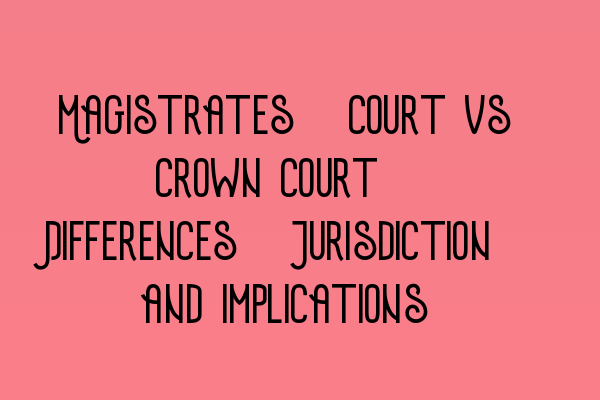Magistrates’ Court vs Crown Court: Differences, Jurisdiction, and Implications
When it comes to the criminal justice system in the UK, there are two main types of courts that handle criminal cases: the Magistrates’ Court and the Crown Court. Understanding the differences between these two courts is essential, as it can have significant implications for both defendants and legal professionals. In this article, we will delve into the contrasts, jurisdiction, and implications of these courts.
The Magistrates’ Court
The Magistrates’ Court, also known as the “lower court,” is the first point of entry for most criminal cases. This court handles the majority of criminal matters, such as minor offenses, summary offenses, and preliminary hearings for more serious offenses. Magistrates’ Courts are presided over by lay magistrates or a District Judge, who make decisions on both guilt and sentencing.
One key aspect of the Magistrates’ Court is its limited sentencing powers. Generally, the maximum custodial sentence that can be imposed is 6 months for a single offense or 12 months for multiple offenses. However, some offenses may have higher maximum sentences specified by legislation. For more serious cases, the Magistrates’ Court has the power to commit the case to the Crown Court for trial.
It is important to note that the Magistrates’ Court hears cases in a summary trial format, meaning no jury is present. The decision on guilt or innocence rests solely with the magistrate(s) or judge. Defendants also have the option to indicate whether they plead guilty or not guilty. If a defendant pleads guilty, the Magistrates’ Court will proceed to sentencing.
While the Magistrates’ Court deals with a wide range of cases, it is worth mentioning that complex cases, such as those involving serious violence, sexual offenses, or offenses with higher sentencing powers, are typically escalated to the Crown Court for trial.
The Crown Court
The Crown Court, also known as the “higher court,” has more authority and handles the more serious criminal cases that warrant a trial by jury. These cases include indictable offenses, such as murder, rape, large-scale fraud, drug trafficking, and other serious crimes. The Crown Court is presided over by a Circuit Judge or a High Court Judge, with a jury of 12 randomly selected members of the public determining guilt or innocence.
Unlike the Magistrates’ Court, the Crown Court has greater sentencing powers and can impose longer custodial sentences upon conviction. Some offenses may carry life imprisonment as the maximum penalty. Moreover, the Crown Court can also hear cases that have been committed by the Magistrates’ Court for sentencing purposes.
It is important to highlight that the Crown Court offers a more formal and structured trial process. The legal teams present their cases in front of the judge and jury, and all evidence is thoroughly examined and tested. This provides a fair and impartial environment for the determination of guilt or innocence.
Implications for Defendants
The court in which a case is heard can have significant implications for defendants. In the Magistrates’ Court, defendants often face more limited sentencing options, and the absence of a jury means that their fate rests solely on the magistrate(s) or judge. However, the informality of the Magistrates’ Court can sometimes result in a quicker resolution for less serious cases.
On the other hand, the Crown Court presents a more formal and structured trial process, with the involvement of a jury. Defendants facing trial in the Crown Court may have access to a wider range of legal representation, including barristers, due to the complexity and seriousness of the cases. While the Crown Court offers greater sentencing powers, the potential for longer custodial sentences means that defendants may face more severe consequences if found guilty.
Conclusion
Understanding the key differences between the Magistrates’ Court and the Crown Court is crucial in comprehending the criminal justice system in the UK. The Magistrates’ Court serves as the lower court, primarily dealing with less serious offenses and acting as a gatekeeper for cases that need to be escalated to the Crown Court. The Crown Court, as the higher court, handles more serious cases and provides a formal trial process with jury involvement and greater sentencing powers.
At SQE Criminal Law & Practice Law UK, we are committed to providing comprehensive legal education and resources to help aspiring legal professionals navigate the intricacies of the criminal justice system. If you want to expand your expertise in criminal practice, consider attending our Workshops and Seminars on Criminal Practice: Expanding Your Expertise.
It is essential to stay informed and prepared for updates in the UK criminal laws. Read our article on Updates in UK Criminal Laws: Staying Informed and Prepared to ensure you are up-to-date with the latest changes.
Enhance your SQE Criminal Law study group experience with our tips and strategies. Learn more in our article on Enhancing Your SQE Criminal Law Study Group Experience.
Decoding criminal evidence rules is crucial for legal professionals. Gain a detailed analysis in our article on Decoding Criminal Evidence Rules: A Detailed Analysis.
Are you interested in fraud and financial crimes in the UK? Dive deep into this topic with our comprehensive article on Deep Dive into Fraud and Financial Crimes in the UK.
